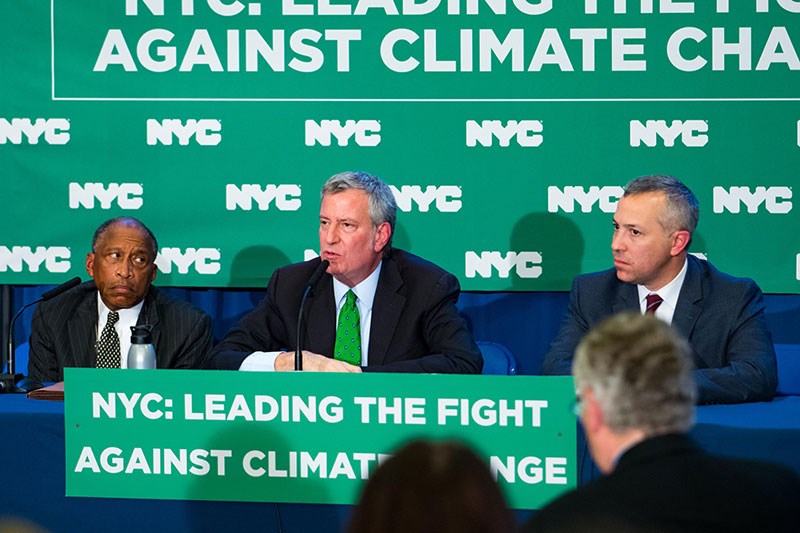New York City may become the first major US city to divest from fossil fuels, Mayor Bill de Blasio and Comptroller Scott M. Stringer revealed on Wednesday. Within five years, according to their announcement, they plan to divest $189 billion of the city's pension funds from fossil fuel companies. Currently, New York City's five pension funds have about $5 billion in fossil fuel investments.
"This is a first-in-the-nation step to protect our future and our planet," said Stringer. "It's complex, it will take time, and there are going to be many steps. But we're breaking new ground, and we are committed to forging a path forward while remaining laser-focused on our role as fiduciaries to the systems and beneficiaries we serve."
Additionally, the city is suing the five largest oil companies - BP, Chevron, ConocoPhillips, Exxon Mobil and Royal Dutch Shell - for their contributions to global warming. De Blasio said that the lawsuit seeks to recover the funds needed to implement necessary resiliency measures to protect the city's residents and property from the impacts of climate change. These measures include upgrades to physical infrastructure, coastal protection and heat mitigation, among others, but also public health campaigns to help protect residents from the effects of climate change such as extreme heat.
"I'm looking forward to the lawsuits against oil tycoons and what this will mean for the fight against climate change, as well as, the precedent we are setting for how we want our world to be," said Councilmember Rafael Espinal. "As the largest city in the country, New York should always lead and set the bar for how we will combat climate change. Divesting our pensions from fossil fuels is a big step in that direction."
The city stated that the fossil fuel industry was well aware of the effects that burning fossil fuels would have of the expected impacts of climate change since the 1980s. According to a recent analysis, more than half of the greenhouse gas pollution from the fossil fuel industry has occurred since 1988; sea levels have risen about one foot since 1900; the most powerful storms - like Hurricane Sandy - are becoming more frequent, and flooding is becoming more frequent and intense.
To prepare NYC's neighborhoods, economy and public services to these treats, the city plans to implement an over $20 billion program. The trustees expect to carry out the divestment plan in stages. First, they will commission an analysis of the anticipated impact of the divestment on the city's financial portfolio provided by the City Comptroller's Bureau of Asset Management (BAM), followed by a legal analysis as to whether the divestment would be consistent with trustees' fiduciary duties to its beneficiaries.
"We have a responsibility to make decisions that preserve our planet for future generations," said Representative Nydia M. Velázquez. "By ensuring New York's pension funds divest from polluters, our city will be voting with its dollars for a greener, more sustainable future."


.png;w=120;h=114;mode=crop)

